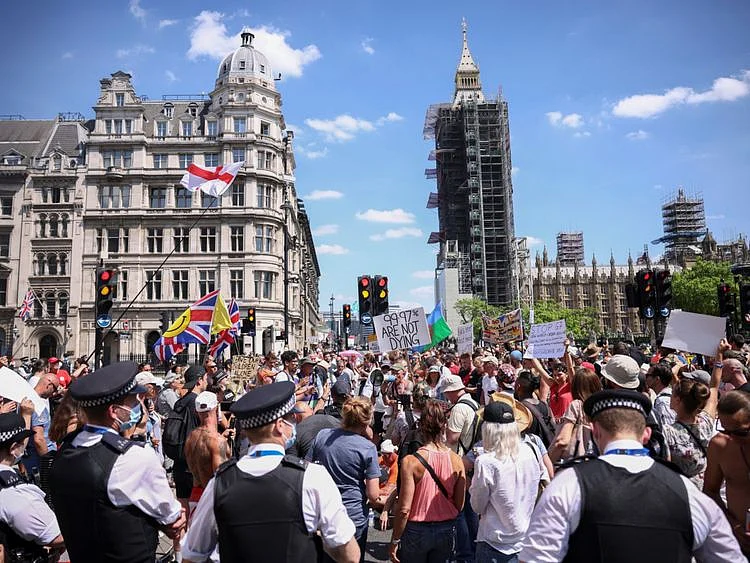Johnson set to delay England’s ‘freedom day’ until July 19 as Delta variant cases climb
Scientists estimate 90% of new cases in Britain are from the Delta strain

LONDON: Britain’s media widely reported on Monday that Prime Minister Boris Johnson was set to delay the widely anticipated lifting of all restrictions under pressure from rising infections linked to a more virulent variant of the coronavirus.
According to media reports, the British cabinet late on Sunday agreed to postpone the final relaxing of all restrictions from June 21 — also nicknamed by many in Britain as “freedom day” — for at least until July 19.
“Wait Four It,” read the front page of the Daily Mirror on Monday, along with the words “freedom day on hold,” while the Daily Mail’s front cover read “Ecstasy and Agony,” which was both a tribute to the England soccer team’s Euro win against Croatia on Sunday and commiseration that the June 21 deadline probably would be pushed back.
Appearing on Sky on News on Monday, Edward Argar, a junior health and social care minister, declined to discuss Johnson’s announcement, which is expected later in the day. But he confirmed government worries over rising cases of the Delta virus variant, which was first discovered in India. He described it as 40% more infectious than the earlier Alpha variant first found in Britain.
“That’s what’s driving the spike. We’ve gone in a week from 12,000 cases to about 40,000 cases, and that’s a big jump,” he said, describing it as “highly, highly infectious.” Scientists estimate that 90% of the new cases in Britain are from the Delta variant.
The symptoms of the Delta variant, labelled a “variant of concern” by the World Health Organisation, include a headache and runny nose. The strain is now dominant in almost every region of the country, according to recent data.
Idea is to get more people vaccinated
The idea behind the delay, according to reports, is to get more people vaccinated, especially with their second dose, before all restrictions are lifted. Recent studies indicate that after a first dose of the Oxford-AstraZeneca or Pfizer-BioNTech coronavirus vaccines, people are only about 33% protected from the delta variant, but that rises to over 80% with the second dose.
Britain has concentrated on getting as many people as possible a first dose of a coronavirus vaccine. About 41 million people, or nearly 79% of the adult population, have received at least one shot. Only 30 million people, however, are fully vaccinated.
The Guardian reported on Monday that Johnson’s choice to delay the easing of more restrictions “could keep thousands out of hospital,” allowing for up to 9 million more people to receive their second dose of a coronavirus vaccine.
The extension of restrictions would mean that nightclubs would remain closed, and limits would continue on indoor dining, sports venues, weddings and cinemas. People will continue to be encouraged to work from home and to continue wearing face coverings in public spaces. Health Secretary Matt Hancock has in the past expressed hope that wearing masks on public transportation to reduce the virus’s transmission may become the standard as life returns to normal.
The British government has long been criticised for its handling of the pandemic that has claimed more than 128,000 lives in the country. Many believe the Britain was not locked down soon enough — with Johnson waiting until March last year to urge people to stay home. National Health Service workers also say the had inadequate access to personal protective wear and testing - especially in the early months of the pandemic.
The government has also been scrutinised for not shutting borders or imposing travel restrictions soon enough - with many asking why and how the variant first identified in India was able to spread on British soil so freely.
On social media Monday, many exasperated Brits took to Twitter to vent their frustration that after three nationwide lockdowns, freedom day had been delayed. Using the hashtag #lockdownextension, many wrote that they were fed up with restrictions, while others contemplated what Johnson’s decision would mean for the entertainment industry and those planning to get married this summer.
Sign up for the Daily Briefing
Get the latest news and updates straight to your inbox
Network Links
GN StoreDownload our app
© Al Nisr Publishing LLC 2025. All rights reserved.